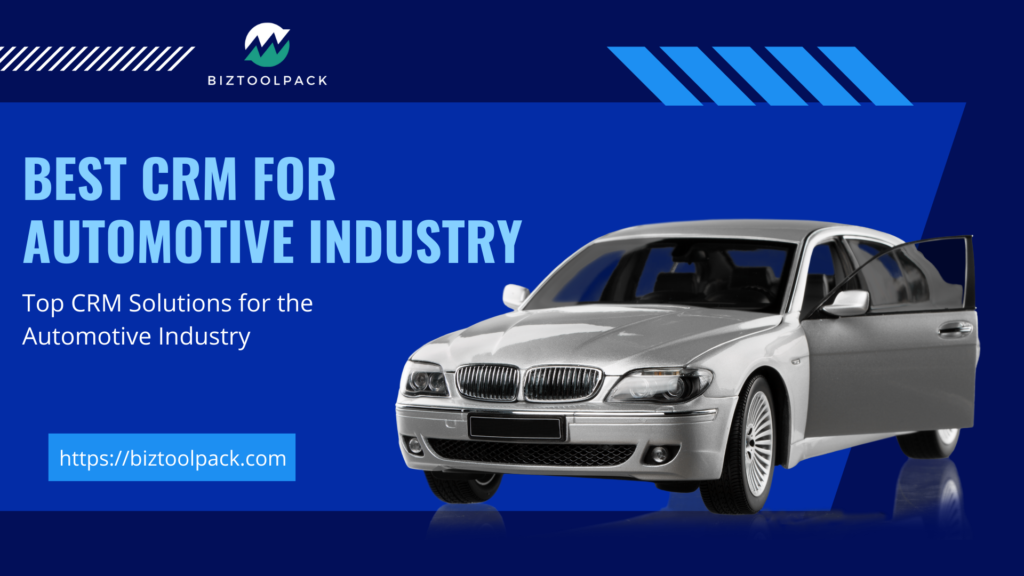Did you know that businesses using a CRM system experience a 29% increase in sales?
In today’s highly competitive automotive industry, maintaining strong customer relationships is more critical than ever. As Palash Pramanik, a seasoned CRM expert, I’ve witnessed firsthand how the right Customer Relationship Management (CRM) system can transform businesses, driving not just sales but also customer satisfaction and loyalty. This comprehensive guide aims to help automotive businesses like yours navigate the myriad of CRM options available, ensuring you select the best CRM for the automotive industry that aligns perfectly with your unique needs.
Introduction
Did you know that businesses using a CRM system experience a 29% increase in sales? This statistic underscores the profound impact a robust CRM can have on your business’s bottom line, especially in the automotive sector where customer relationships are pivotal.
The objective of this article is to compare the top CRM solutions tailored specifically for the automotive industry. Whether you’re managing a dealership, a repair shop, or an automotive parts business, selecting the right CRM can streamline your operations and enhance customer interactions.
Choosing the right CRM is not just about managing customer data; it’s about fostering long-term relationships, improving customer retention, and optimizing your business processes. A well-integrated CRM system can help automotive businesses achieve operational excellence, leading to sustained growth and success.
In this article, we will delve into the key features you should look for in a CRM tailored for the automotive industry, review the top five CRM solutions available, provide recommendations based on specific business needs, and offer a step-by-step guide to help you make an informed decision. Additionally, we’ll address common questions to ensure you have all the information you need to choose the best CRM for your automotive business.
What to Look for in a CRM for Your Automotive Business
Scalability
As your automotive business grows, your CRM needs to scale seamlessly with it. A scalable CRM can handle increasing amounts of data, support a growing number of users, and adapt to expanding business operations without compromising performance. Whether you’re a small dealership looking to expand or a large automotive enterprise planning to diversify your services, ensuring your CRM can scale is crucial for long-term success.
Ease of Use
An intuitive and user-friendly interface is essential, especially for businesses new to CRM systems. An easy-to-navigate CRM reduces the learning curve, ensuring that your team can adopt the system quickly and efficiently. Features like drag-and-drop functionality, customizable dashboards, and straightforward navigation enhance user experience, making it easier for your team to manage customer interactions and data effectively.
Customization
Every automotive business has unique workflows and requirements. A CRM that offers extensive customization options allows you to tailor the system to match your specific processes. Whether it’s customizing fields, creating personalized workflows, or integrating with other tools you use, a flexible CRM ensures that it aligns perfectly with your business needs, enhancing efficiency and productivity.
5 Best CRM Solutions for the Automotive Industry
Choosing the best CRM for your automotive business can be daunting given the plethora of options available. Based on my extensive experience, here are the top five CRM solutions that stand out in the automotive industry:
1. HubSpot CRM
HubSpot CRM is a widely-used customer relationship management platform offering a range of tools to manage marketing, sales, and customer service. It’s designed to scale with businesses of all sizes, providing a user-friendly interface and seamless integration across its features. It is highly regarded in industries that require detailed lead tracking, such as automotive dealerships, service centers, and part suppliers.
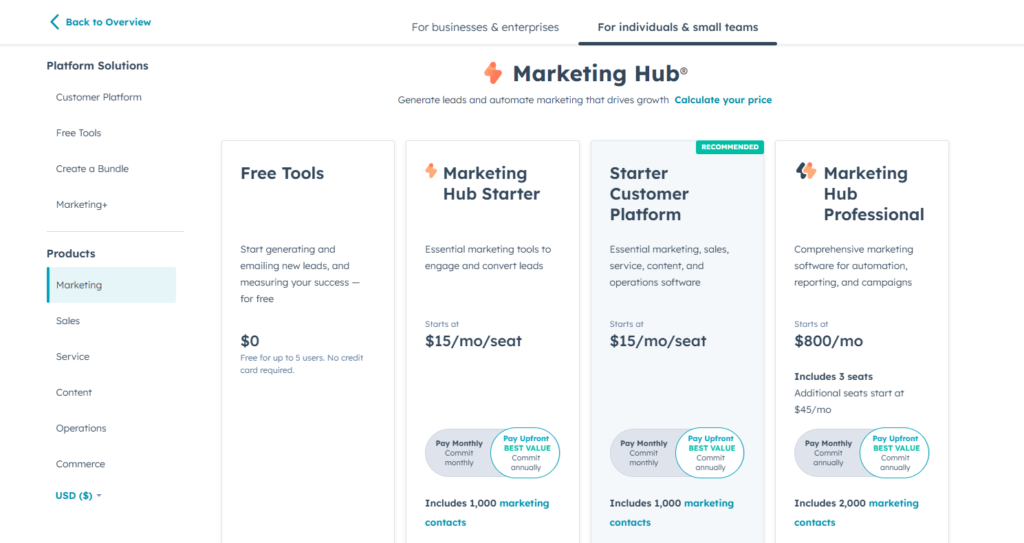
Key Features:
- Lead & Deal Management: Easily track and nurture potential car buyers through every stage of the sales funnel, from inquiries to closing.
- Marketing Automation: Automate email campaigns, track customer interactions, and personalize communication based on user behavior, which is key for automotive marketing.
- Service Hub: Manage service tickets and inquiries for after-sales and customer support, important for auto service centers.
- Customizable Dashboards & Reporting: Provides detailed sales, marketing, and customer service reports, helping automotive businesses monitor performance metrics like sales leads and service requests.
- Integrations: Works seamlessly with other tools commonly used in the automotive industry (e.g., inventory management, dealership management software).
- Mobile-Friendly: Useful for sales reps or technicians on the go, with mobile access to customer data and deals.
Pricing:
- Free Plan: $0/month for core CRM tools like contact management and deal tracking.
- Starter: $15/month (basic marketing, sales, and service tools).
- Professional: $800/month (advanced automation, reporting, and team collaboration features).
- Enterprise: $3,600/month (high-level customization, advanced reporting, and governance).
- Small to Medium-Sized Dealerships: Looking to manage customer relationships, track leads, and automate marketing with a limited budget.
- Service Centers & Parts Dealers: Wanting to streamline service requests and customer support processes.
- Large Automotive Companies: Needing advanced sales pipeline management, marketing automation, and detailed reporting across multiple locations.
2. Pipedrive CRM
Pipedrive is a sales-focused CRM designed to simplify pipeline management and boost sales efficiency. Its intuitive interface and visual sales pipeline make it a favorite among small and mid-sized businesses. Pipedrive is ideal for automotive companies looking to organize their sales processes, track leads, and manage customer interactions with ease.
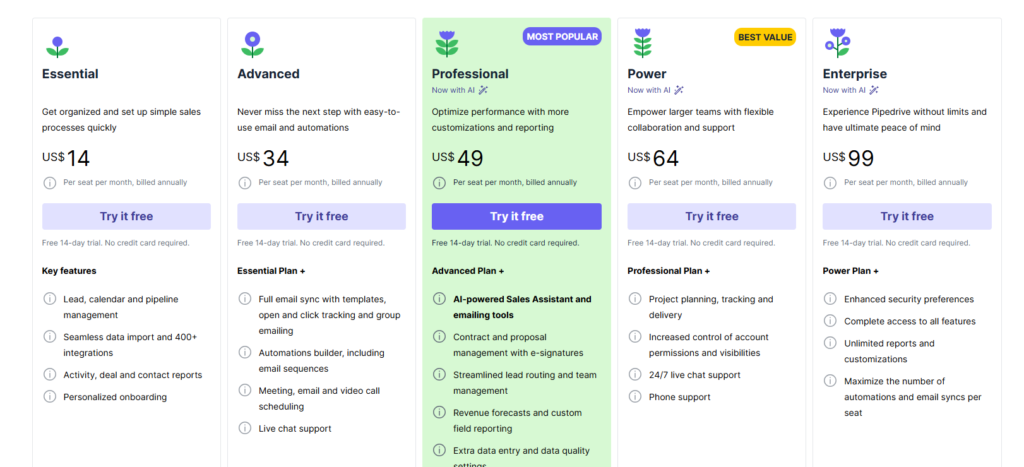
Key Features:
- Visual Sales Pipeline: Offers a clear visual representation of deals and stages, allowing automotive dealerships to track and move leads through the sales funnel efficiently.
- Lead Management: Organizes leads and contacts from multiple sources, helping auto sales teams keep track of potential buyers and follow-ups.
- Customizable Pipelines: Tailors sales pipelines to fit the unique needs of car dealerships, whether it’s for new or used car sales, enabling better deal tracking.
- Email Integration: Syncs with email to track communication with leads, providing context for sales reps when following up with customers.
- Activity Reminders: Automatically sets reminders for sales tasks, such as following up with a customer after a test drive, ensuring no lead goes cold.
- Sales Reporting: Delivers detailed insights into sales performance, helping automotive businesses make data-driven decisions to improve closing rates.
- Mobile App: Perfect for sales reps on the go, allowing them to access customer data and update the pipeline while in the field or at the dealership.
Pricing:
- Essential Plan: $14/month per user (basic pipeline management).
- Advanced Plan: $34/month per user (automation, email sync).
- Professional Plan: $49/month per user (enhanced reporting, group emails).
- Power Plan: $64/month per user (advanced permissions, integrations).
- Enterprise Plan: $99/month per user (customization, dedicated support).
- Small to Medium-Sized Automotive Dealerships: Needing an easy-to-use, visual sales pipeline for managing leads and sales activities.
- Car Sales Teams: Looking to streamline follow-up processes and stay organized with customizable pipelines.
- Independent Dealerships: Wanting a cost-effective CRM that tracks performance and manages communication with prospects.
3. Salesforce Automotive Cloud CRM
Salesforce Automotive Cloud is a specialized CRM designed specifically for the automotive industry. It provides tailored tools to help manufacturers, dealerships, and suppliers enhance customer relationships, streamline sales processes, and deliver personalized service experiences. With its deep industry focus, it offers solutions that cater to the unique needs of automotive sales, service, and marketing teams.
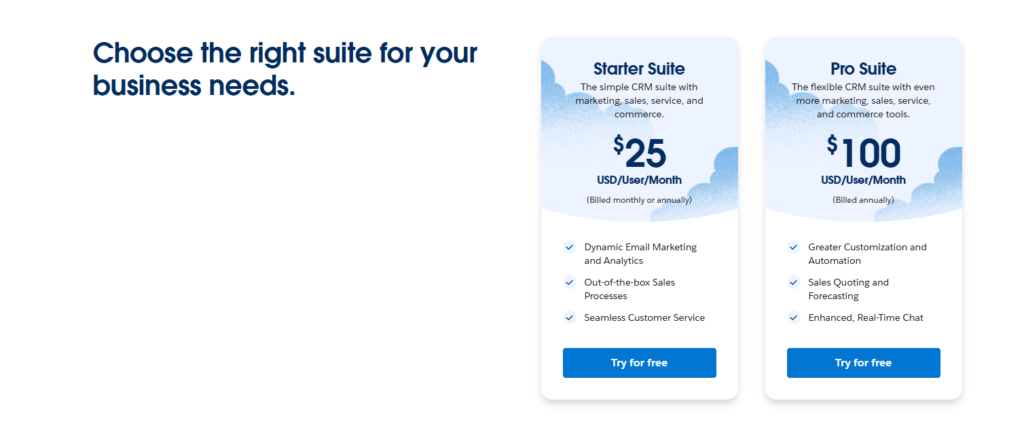
Key Features:
- Customer 360: Provides a holistic view of every customer, including their purchase history, vehicle preferences, service records, and real-time engagement, allowing for personalized sales and service experiences.
- Lead & Opportunity Management: Tracks leads, potential buyers, and sales opportunities, making it easy to follow up and close deals efficiently.
- Service Management: Manages service appointments, tracks repairs, and provides real-time updates to customers, crucial for dealerships and service centers.
- Connected Vehicle Insights: Integrates telematics and vehicle data to offer real-time insights, which can help dealers monitor vehicle health and offer proactive services.
- Omnichannel Communication: Provides seamless customer interactions through phone, email, SMS, and social media, ensuring timely communication with customers and prospects.
- AI-Driven Insights: Salesforce Einstein AI offers predictive analytics for sales forecasting, customer behavior analysis, and personalized marketing, giving a competitive edge in customer engagement.
Pricing:
- Pricing for Salesforce Automotive Cloud is typically custom and depends on the size of the business and specific needs. However, Salesforce’s general CRM packages start as follows:
- Essentials: $25/user/month
- Professional: $75/user/month
- Enterprise: $150/user/month
- Unlimited: $300/user/month
- Automotive-specific features may have additional costs based on configuration.
- Large Automotive Dealerships & OEMs: Ideal for enterprises looking for extensive customization, integration with existing systems, and detailed customer data analysis.
- Automotive Service Centers: Beneficial for managing service appointments, repairs, and customer engagement.
- Vehicle Manufacturers: Provides tools for managing dealer networks, service operations, and customer lifecycle.
4. Zoho CRM
Zoho CRM is a powerful, affordable CRM solution designed to help businesses automate sales, marketing, and customer support. Known for its flexibility, Zoho CRM offers extensive customization options and integrations, making it suitable for automotive businesses looking to streamline lead management, enhance customer engagement, and improve sales efficiency.
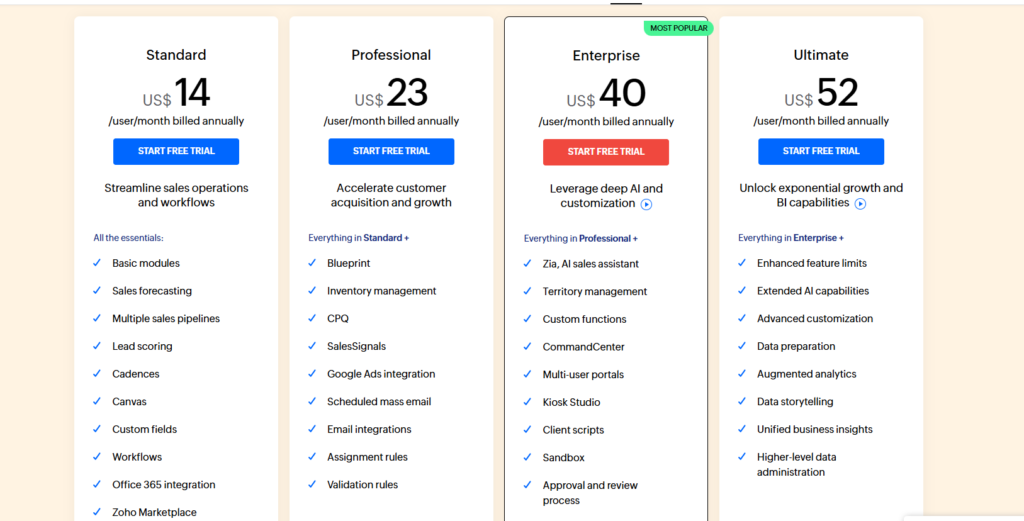
Key Features:
- Lead & Contact Management: Efficiently tracks leads, contacts, and follow-ups, allowing automotive dealers to capture and manage potential buyers at every stage.
- Sales Automation: Automates repetitive sales tasks like follow-up emails and deal tracking, enabling automotive sales teams to focus on closing deals.
- Workflow Automation: Custom workflows for managing different dealership departments like sales, finance, and service, boosting overall efficiency.
- Customizable Dashboards & Reporting: Provides real-time insights into sales, service performance, and customer satisfaction, helping automotive businesses optimize their operations.
- Telephony Integration: Call tracking and integration with third-party apps make it easy for dealerships to manage customer interactions via phone.
- Inventory Management: Useful for tracking vehicle inventory, which is particularly beneficial for dealerships managing large inventories of new and used vehicles.
- Omnichannel Communication: Engage with customers across multiple channels, including social media, email, and live chat, ensuring a consistent customer experience.
Pricing:
- Standard: $14/user/month (basic sales features and contact management).
- Professional: $23/user/month (advanced automation, inventory management, and customer support tools).
- Enterprise: $40/user/month (advanced analytics, AI-powered sales insights, and customization options).
- Ultimate: $52/user/month (complete feature set with premium support and customization).
- Small to Mid-Sized Dealerships: Looking for an affordable, customizable CRM to manage leads, sales, and customer interactions.
- Automotive Service Centers: Wanting to streamline customer service processes and follow up with customers for service reminders.
- Used Car Dealerships: Needing flexible tools to track inventory, manage leads, and nurture customer relationships.
5. Keap CRM
Keap is a CRM and marketing automation platform designed to help small businesses streamline sales, marketing, and customer service. Known for its automation capabilities, Keap is well-suited for businesses that need to manage leads and nurture customer relationships. Its intuitive interface and powerful automation tools can help automotive businesses improve efficiency in lead management and customer follow-ups.
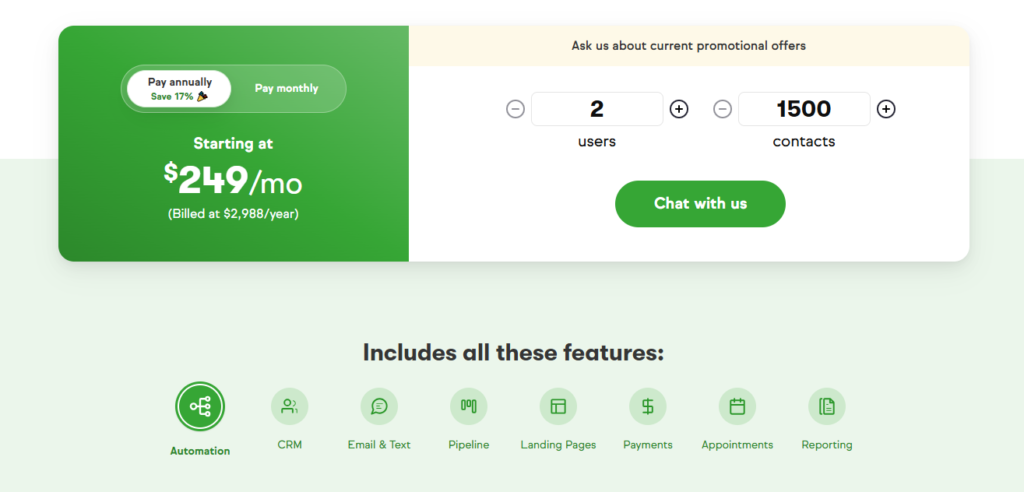
Key Features:
- Marketing Automation: Helps auto dealers automate email marketing campaigns, follow-up messages, and lead nurturing processes, ensuring no customer interaction is missed.
- Lead Management: Automatically captures and organizes leads from different sources (website, social media, forms), which is crucial for automotive businesses managing multiple sales channels.
- Appointment Scheduling: Allows service centers or sales teams to schedule appointments with clients, making it easier for auto businesses to organize test drives or service bookings.
- Sales Pipeline Management: Provides a visual representation of the sales pipeline, allowing dealerships to track leads, deals, and conversions in real time.
- Automated Follow-ups: Sends personalized follow-ups to prospects and customers based on actions or timelines, ensuring that potential buyers are consistently engaged.
- Payment Processing: Enables invoicing and payment collection, useful for dealerships offering financing or service departments collecting payments.
Pricing:
- Pro Plan: $249/month for up to 1,500 contacts and 2 users (additional pricing for more contacts or users). Pricing includes sales automation and marketing tools.
- Small Automotive Dealerships: Looking to automate marketing and lead follow-ups without needing a complex system.
- Independent Used Car Dealers: Needing affordable automation for lead generation and nurturing.
- Service Centers: Seeking to streamline appointment scheduling and automated follow-ups for service reminders.
Which CRM is Best for Your Automotive Business?
Overall Recommendation
After evaluating the top CRM solutions, Salesforce Automotive Cloud emerges as the best CRM for the automotive industry. Its comprehensive feature set, scalability, and robust integration capabilities make it an unparalleled choice for businesses seeking a powerful and flexible CRM system. Whether you’re managing a single dealership or a network of automotive enterprises, Salesforce Automotive Cloud offers the tools and support needed to drive growth and enhance customer relationships.
Use Case Recommendations
While Salesforce Automotive Cloud stands out overall, different automotive businesses may find other CRMs better suited to their specific needs:
- Small to Medium-Sized Dealerships: HubSpot CRM or Zoho CRM offer excellent functionality without the complexity and cost of larger systems.
- Specialized Dealerships: AutoRaptor is ideal for dealerships focused solely on streamlining sales processes with minimal setup.
- Sales-Driven Teams: Pipedrive is perfect for teams that prioritize sales pipeline management and automation.
Next Steps
Choosing the right CRM is a pivotal step towards enhancing your automotive business’s efficiency and customer satisfaction. I encourage you to:
- Start a Free Trial: Most CRM providers offer free trials. Utilize these to explore the features and assess which system aligns best with your business needs.
- Schedule a Demo: Engage with CRM providers to see live demonstrations. This can provide deeper insights into how the CRM functions and how it can be tailored to your specific requirements.
- Consult with Experts: Reach out to CRM consultants or experts like myself to get personalized advice and recommendations based on your unique business challenges and goals.
How to Choose a CRM: A Beginner’s Buying Guide for the Automotive Industry
Selecting the right CRM can be overwhelming, especially if you’re new to CRM systems. Here’s a step-by-step guide to help you make an informed decision:
1. Identify Your Business Needs
Start by outlining your specific requirements. Consider aspects like lead management, customer service, sales tracking, and marketing automation. Understanding your business needs will help you narrow down CRM options that offer the features most relevant to your operations.
2. Evaluate Key Features
Look for essential CRM features that cater to the automotive industry, such as inventory management integration, appointment scheduling, and sales pipeline management. Additionally, consider advanced features like analytics, reporting, and customization options that can enhance your CRM’s functionality.
3. Consider Budget Constraints
Determine your budget for a CRM system. While some CRMs offer free tiers, others come with subscription-based pricing. Evaluate the cost versus the benefits each CRM provides to ensure you’re getting value for your investment.
4. Assess Ease of Use
A user-friendly interface is crucial for ensuring that your team adopts the CRM effectively. Look for CRMs that offer intuitive navigation, customizable dashboards, and comprehensive onboarding support to facilitate a smooth transition.
5. Check Integration Capabilities
Ensure that the CRM can integrate seamlessly with your existing tools and software, such as inventory management systems, email marketing platforms, and accounting software. Integration capabilities can significantly enhance your CRM’s functionality and streamline your business processes.
6. Evaluate Customer Support
Reliable customer support is essential, especially during the initial setup and implementation phases. Look for CRMs that offer comprehensive support options, including live chat, phone support, and extensive knowledge bases.
7. Test with a Free Trial
Before committing, take advantage of free trials to explore the CRM’s features and assess its suitability for your business. Use this opportunity to involve your team and gather feedback on the CRM’s usability and functionality.
8. Make an Informed Decision
After thorough evaluation, choose a CRM that aligns with your business needs, budget, and growth plans. Ensure that the CRM you select not only meets your current requirements but also has the flexibility to adapt as your business evolves.
Conclusion
Selecting the best CRM for the automotive industry is a critical decision that can significantly impact your business’s efficiency, customer satisfaction, and overall growth. We’ve explored the key features to look for in a CRM, reviewed the top five CRM solutions tailored for the automotive sector, and provided a comprehensive guide to help you make an informed choice.
When choosing a CRM, it’s essential to consider not just your current needs but also your long-term business goals. A scalable and customizable CRM will ensure that your system evolves with your business, supporting your growth and adapting to changing market dynamics.
FAQs
1. Do I really need a CRM?
Yes, a CRM system is essential for managing customer relationships, tracking sales, and streamlining business operations. It helps automotive businesses enhance customer satisfaction, improve retention, and drive sales growth.
2. How secure is my data in a CRM?
Most reputable CRM providers prioritize data security, offering features like encryption, secure data storage, and regular backups. It’s important to choose a CRM that complies with industry standards and provides robust security measures to protect your data.
3. Can a CRM integrate with my existing tools?
Yes, many CRM systems offer extensive integration capabilities, allowing seamless connectivity with tools like email marketing platforms, inventory management systems, accounting software, and more. Ensure that the CRM you choose supports integrations with your existing tools.
4. What is the cost of implementing a CRM system?
The cost of a CRM system varies depending on the provider, features, and the number of users. Some CRMs offer free tiers with basic functionality, while others have subscription-based pricing. It’s essential to evaluate your budget and choose a CRM that offers the best value for your investment.
5. How long does it take to set up a CRM?
The setup time for a CRM depends on the complexity of your business processes and the CRM’s features. On average, it can take anywhere from a few days to several weeks. Opting for a CRM with comprehensive onboarding support can expedite the setup process.
6. Can a CRM help improve customer retention?
Absolutely. A CRM helps you track customer interactions, manage follow-ups, and personalize communication, all of which contribute to enhanced customer satisfaction and retention. By providing timely and relevant interactions, a CRM fosters long-term customer loyalty.
7. What features should I prioritize in a CRM for the automotive industry?
Key features to prioritize include lead management, sales pipeline tracking, customer service tools, inventory management integration, appointment scheduling, and robust reporting and analytics. These features cater specifically to the needs of the automotive industry, enhancing operational efficiency.
8. Is a CRM suitable for small automotive businesses?
Yes, CRMs are beneficial for automotive businesses of all sizes. They help small businesses manage customer relationships, track sales, and streamline operations, enabling them to compete effectively in the market.
9. Can a CRM help with marketing efforts?
Yes, many CRM systems offer integrated marketing tools such as email marketing, campaign management, and social media integration. These features help automotive businesses execute targeted marketing campaigns and measure their effectiveness.
10. What should I do if I encounter issues with my CRM?
If you encounter issues with your CRM, reach out to the provider’s customer support for assistance. Most CRM providers offer multiple support channels, including live chat, phone support, and comprehensive knowledge bases to help you resolve any problems quickly.
I’m Palash Pramanik, an SEO and CRM expert with a deep passion for helping businesses thrive online. I specialize in driving higher search engine rankings and creating seamless customer relationship management strategies to enhance both visibility and engagement. Whether you need to boost your online presence, attract the right audience, or streamline your client interactions, I offer tailored solutions designed to meet your specific needs. My goal is to help you optimize your digital strategy, strengthen customer connections, and drive sustainable growth. Let’s work together to elevate your business to new heights!

